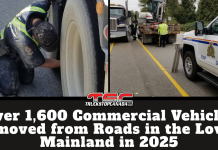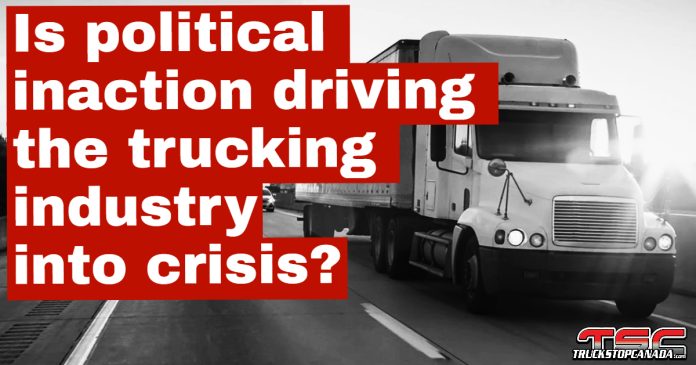Since the pandemic, the trucking sector has faced blow after blow: a persistent labor shortage, skyrocketing operating costs, plunging freight rates, and chronic overcapacity.
In simple terms, there have been more trucks than goods to move for years. Too many carriers are chasing too little freight, forcing companies to accept money-losing contracts just to keep wheels turning.
In this fragile environment, every economic shock—whether inflation, tariffs, or falling demand—now triggers a new wave of layoffs and shutdowns across the continent.
A Crisis That Didn’t Start Yesterday
The driver shortage isn’t new, but the COVID-19 crisis made it worse. Thousands of truckers left the industry, discouraged by isolation, long hours, border closures, and a lack of support. Younger workers haven’t stepped in to replace them, and the workforce is aging fast.
To fill the gap, governments accelerated immigration programs, helping bring in new talent—but also creating new vulnerabilities. Unscrupulous companies exploited foreign workers, imposing illegal or precarious conditions. Questionable driving schools handed out licenses to undertrained drivers, putting public safety at risk. In this climate, shady practices like the Driver Inc model spread rapidly, taking advantage of regulatory confusion and urgent hiring needs.
Meanwhile, operating costs exploded. Fuel, parts, insurance, and maintenance are at record highs, while freight rates continue to plunge. Between 2022 and 2024, an all-out price war emerged, forcing carriers—especially smaller ones—to haul freight at a loss or leave trucks parked. Staying profitable has become a daily struggle.
When Climate Change Becomes a Supply Chain Risk
The trucking industry doesn’t operate in a vacuum. Climate instability is now a supply chain issue. In California, extreme droughts and erratic weather have damaged fruit and vegetable production, leading to temporary shortages and shaky logistics. Fewer goods to move means more uncertainty and less revenue for cross-border carriers already fighting to stay afloat.
Adding to the strain is a growing movement among Canadian consumers and businesses to boycott American products—whether for political, environmental, or economic reasons. While still partial, this shift reduces import volumes and cross-border shipments, tightening the squeeze on trucking companies operating in both countries.
The Dangerous Rise of Double Brokering
Double brokering—when a carrier accepts a shipment and illegally reassigns it to another without the shipper’s knowledge—is making things worse. This unauthorized subcontracting muddies the chain of accountability and complicates insurance claims when incidents occur.
But the financial impact is just as damaging. Each middleman takes a cut, and by the time the actual carrier is paid, the rate is often too low to cover their operating costs. Honest companies lose out, and the system rewards bad actors.
Driver Inc: A Parallel System That Undermines the Industry
The Driver Inc scheme is one of the most damaging problems in Canadian trucking. It involves companies misclassifying employees as independent contractors—drivers who, in reality, operate under the company’s full control. Unlike legitimate owner-operators (or brokers), these drivers don’t run their own businesses. The model lets companies avoid paying employment insurance, pension contributions, workers’ compensation, and other legal obligations.
Most of the time, the drivers affected—often newcomers to Canada—don’t realize they’re being shortchanged. They end up with no benefits, no paid leave, and no safety net if injured.
This widespread abuse is destabilizing the entire industry. Compliant companies that respect labor laws, safety regulations, and tax obligations can’t compete with carriers offering rates up to 30% lower by bypassing legal payroll requirements. It’s a race to the bottom—one that erodes wages, working conditions, and public safety.
Government agencies lose out too. According to the Canadian Trucking Alliance (CTA) and the Quebec Trucking Association (ACQ), Driver Inc costs hundreds of millions of dollars annually in unpaid contributions. And the model is no longer underground: in provinces like Ontario and Quebec, it has become so normalized that some recruiters and driving schools openly push new arrivals toward incorporation.
Meanwhile, ethical carriers who invest in safety, vehicle maintenance, and fair working conditions are being squeezed out of a market where the cheapest bid wins—regardless of legality or ethics. Shippers and brokers routinely turn a blind eye, awarding contracts to the lowest bidder even when warning signs are obvious.
As long as governments tolerate two tax systems within the same industry—one legal, one not—the sector will remain trapped in a destructive cycle. Stronger enforcement, real penalties, and structural reform are urgently needed.
A System That Punishes the Honest
In 2024, Réal Gagnon, founder of Trans-West, publicly denounced the Driver Inc model, becoming one of the first major voices to break the silence. The ACQ continues to pressure government officials for decisive action. But so far, little has changed.
Trans-West, known for its focus on safety and customer service, had to lay off staff and sell 25 trucks. And they are far from alone.
The new tariffs introduced in 2025 dealt another blow. McKevitt Trucking, a family business in Thunder Bay founded in 1948, closed after 76 years—cutting 81 driver jobs. A symbol of longevity, now gone.
In Brampton—ground zero for Driver Inc—the outlook is grim. A March 2025 survey found that nearly one-third of local carriers had already initiated layoffs, and over 60% were expecting more cuts without government intervention. Cross-border shipping has slowed, rates are stagnant, and costs are rising.
Truck manufacturing isn’t immune either. In Sainte-Thérèse, Québec, the Paccar plant that assembles Kenworth and Peterbilt trucks is laying off 175 workers in August—on top of 250 already cut in December. Union reps cite falling orders and raw material tariffs as major concerns.
The U.S. Trucking Crisis Mirrors Canada’s
South of the border, the picture is just as bleak. UPS, often seen as an economic bellwether, announced 20,000 job cuts and plans to close 73 facilities. CEO Carol Tomé cited global trade uncertainty, low consumer confidence, and weak volumes, especially from small businesses.
Across the logistics sector, layoffs and closures are accelerating: LSC Communications, Americold, Lightspeed Logistics, CarParts.com, MacMillan-Piper, and GSC Enterprises have all slashed operations. Manufacturers like Cleveland-Cliffs, Smurfit Westrock, and Georgia-Pacific are scaling back as demand falls sharply.
Automation adds another challenge. At UPS, over 64% of packages now move through automated hubs—with robotic sorting, automatic labeling, and mechanical loading. Productivity is rising, but thousands of stable, unionized jobs are disappearing.
A Sector Near Collapse
North American trucking is caught in a perfect storm of post-pandemic fatigue, rate erosion, systemic fraud, political inaction, and now trade warfare. Every warning light is flashing red—and yet, meaningful reforms are nowhere in sight.
Carriers are folding. Brokers are struggling. Truckers are being laid off. Manufacturers are reducing production. The supply chain is weaker. Roads are less safe.
Allowing this crisis to fester punishes the honest, rewards the fraudulent, and jeopardizes an industry that is the backbone of our economy.
Why do compliant carriers keep losing while Driver Inc thrives under a parallel tax system—with the tacit blessing of regulators?
The time for timid action is over. Canada and the U.S. need strong leadership, clear rules, real enforcement, and public contracts that prioritize ethics—not just price.
If we fail to act, it won’t just be trucks left idle—it will be an entire sector stuck in reverse.















